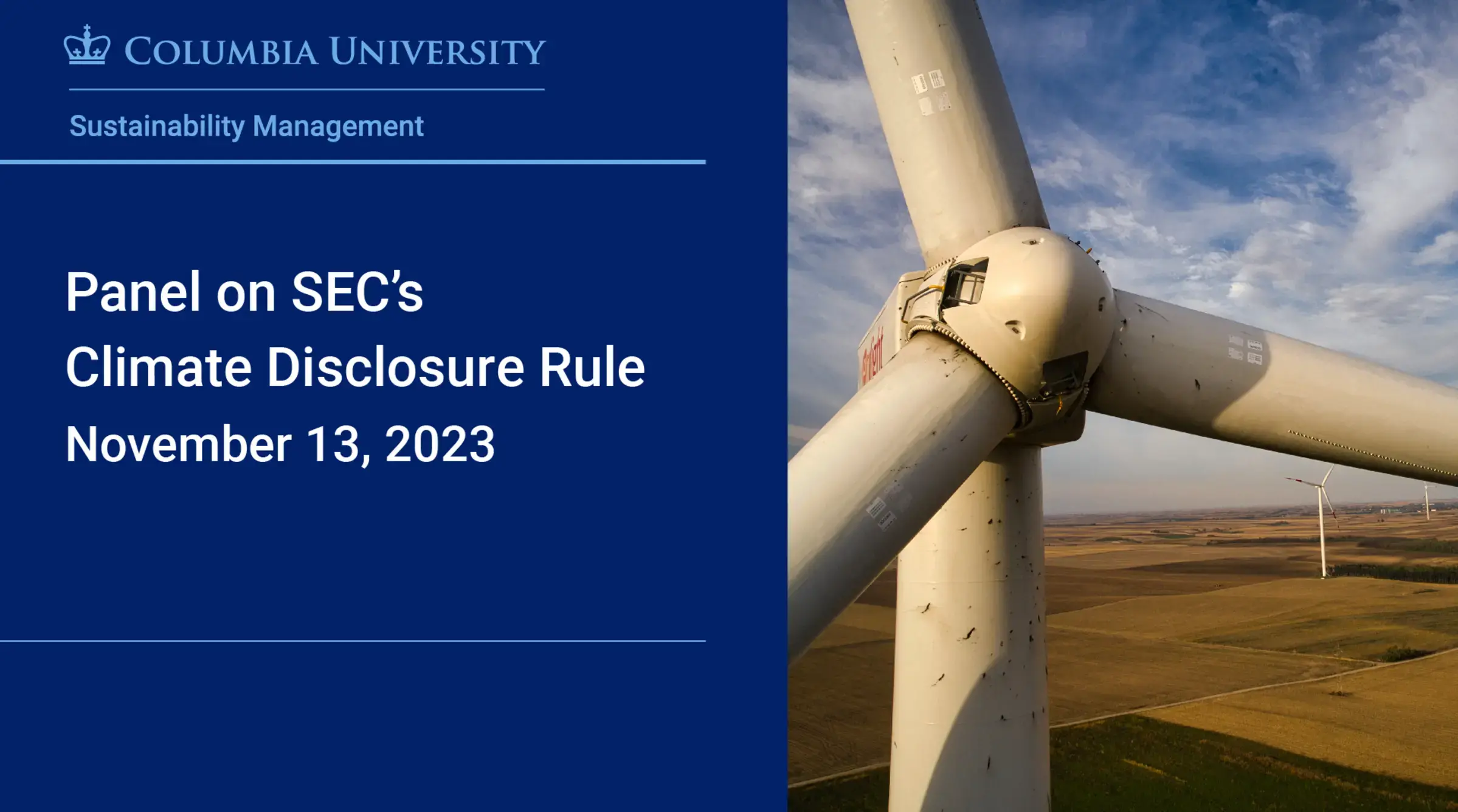On November 13, a panel of expert Columbia University faculty examined the impact of the U.S. Securities and Exchange Commission’s (SEC) proposed climate disclosure rule. The panel was composed of experts across the disciplines of law, finance, sustainability, and corporate reporting. They discussed how the SEC climate disclosure rule will change the way corporations approach business, risk, and the landscape of ESG (environmental, social, and governance) and corporate reporting.
Moderated by Steven Cohen, program director of the M.S. in Sustainability Management (SUMA) and senior vice dean at the Columbia University School of Professional Studies (SPS), the panel presented a high-level introduction to the world of mandated carbon disclosure by breaking down the SEC’s new disclosure requirements, how companies are preparing to meet these requirements, and the potential impact on financial markets.
Disclosure: California and the SEC
Since the SEC first made its broader climate disclosure requirements in 2010, many companies have made incremental improvements in reporting. What’s driving this increase? Investor demand.
In March 2022, the SEC went further and issued proposed rules to increase disclosure for material risks around climate change, something many companies have already begun investing time and money to do.
So why the delay in approving these rules, particularly when the EU and California have already “leapfrogged” the proposed rules? Taylor Pullins, lecturer in Professional Studies in the SUMA program, pointed out that “you have to provide the public an opportunity to provide public review and comment.” The response to the proposed guidelines crashed the SEC’s website as a result of the sheer volume of comments. Combine that with its being an odd year and thus not an overly important one politically, and the proposal has been stymied—but looks likely to be finalized in 2024 with the advent of another election on the horizon.
Michael Gerrard, director of the Sabin Center for Climate Change Law at Columbia Law School, spoke of the impact of the disclosure laws in the works on the West Coast. Gerrard shared that California’s progress with three new laws could make the relevance of the SEC’s decision regarding the new disclosure rules irrelevant. The SEC’s rule applies to public companies, but one of California’s covers both private and public companies. California’s recent laws also put carbon offsets to the test with extensive reporting requirements.

(l to r) Steven Cohen, Michael Gerrard, Taylor Pullins, Celine Ruben-Salama, and Satyajit Bose. Photo credit: April Renae
How Companies Are Preparing
Celine Ruben-Salama, lecturer in the SUMA program, pointed out that it’s a “how,” not a “what,” when it comes to larger companies preparing for the implementation of the SEC rules.
So how are they preparing? “Companies are really looking harder, applying more due diligence, saying, ‘Are we really doing this in the best possible way?’” said Ruben-Salama. Third-party carbon emissions verifications and investment in internal data and accounting systems are among the tools she sees these companies using.
As for the “who,” Ruben-Salama points out increased involvement from CFOs, who tend toward the more conservative regarding voluntary reports. She believes this involvement indicates that a period of retrenchment for larger businesses is on the horizon. Smaller companies are behind when it comes to existing reporting standards, but like their larger counterparts, they are also ramping up what they are doing when it comes to reporting.
The Potential Impact on Financial Markets
Satyajit Bose, professor of professional practice in Sustainability Management, spoke on the financial impact the SEC’s rules could have. Bose said that financial markets work best with total transparency, which is part of the reason that investor disclosure guidelines, like those proposed by the SEC, are so important.
“If the U.S. does not provide good transparency, then its capital markets will lag behind those of the EU,” said Bose. Uniformity in disclosures seems to be key, and the new rules could make the U.S. more competitive in global financial markets as they create a standard that allows for benchmarking.
About the Program
Columbia University’s Master of Science in Sustainability Management program features interdisciplinary training from the world’s premier sustainability academics, researchers, and practitioners. Students learn the use of leading-edge policy and management tools that can help businesses, NGOs, and governments address critical sustainability issues. The up-to-the-minute curriculum is created by the world-leading Columbia Climate School and combines the physical dimensions of sustainability with general and financial management, economics, quantitative analysis, and policy so that graduates can thrive in the job market.



